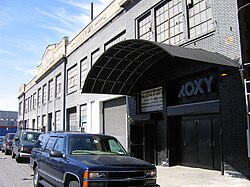Roxy NYC
| The Roxy | |

Exterior of Roxy
|
|
| Location | New York City (Chelsea, Manhattan), New York, United States |
|---|---|
| Owner | Richard Newhouse & Steven Greenberg (1978-1985) as Roxy's Roller Disco Gene DiNino (1985-2007) |
| Type | roller rink and nightclub |
| Opened | 1978 |
| Closed | 2007 |
Coordinates: 40°44′42″N 74°00′25″W / 40.745013°N 74.006959°W
Roxy NYC (sometimes The Roxy) was a popular nightclub located at 515 West 18th Street in New York City. Located in the Chelsea section of Manhattan, it began as a roller skating rink and roller disco in 1978, founded by Steve Bauman, Richard Newhouse and Steve Greenberg. It was acquired in 1985 by Gene DiNino. The Roxy shut down permanently in March 2007.
The Roxy hosted a party for the famed Olympic gold medal-winning USA Ice Hockey team in 1980.
Beginning in the early 1980s, the owners began hosting dance nights. Referred to by many as the “Studio 54 of roller rinks,” these parties thrived for several years. Then, as the popularity of skating began to fade, the space was revamped into a dance club in 1982.
Ruza Blue, nicknamed "Kool Lady Blue", founded an all-races dance club in June 1982 (formerly at Club Negril 1981 - 82) which featured a mash up of all musical styles from early hip hop, electro, funk, soul, disco, rock, punk, dub and electronic dance music.Jon Baker, the future founder of Gee Street Records, worked the door. Hip hop pioneers such as Afrika Bambaataa began DJing there and the club sponsored breaking or b-boy/b-girl competitions featuring the Rock Steady Crew,graffiti artists' murals, and even double-dutch exhibitions by The Fantastic Four local American Double Dutch League champions with emcees hosting the nights. Artists such as Madonna, Run DMC, Kraftwerk, Shannon, Malcolm McLaren, New Edition, Kurtis Blow, The Beastie Boys and Yello performed there. The site of many "dance floor tests" by recording artists, producers and remixers, the clubs's notoriously discerning, racially mixed clientele and cross cultural ethos was considered the ideal crowd to inspire on the dance floor. It was here that DJ's first played the test record of EBN-OZN's white rap/spoken word "AEIOU Sometimes Y" in 1982, the first commercially released record made on a computer in the United States. The club had a major influence on the evolution of hip hop culture and electronic dance music culture worldwide.
...
Wikipedia
